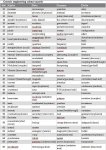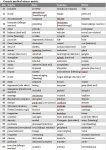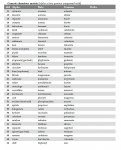I think I may have cracked it! So this version has the following features:
1) Player choice. The player generates two potential solutions, and may abort either and start new ones at any time.
2) Properties. Certain keywords have properties attached which are triggered automatically or cause complications on a failed check.
3) Customization. A generic engineering and a generic medical matrix are included, but you can create any matrices you want, as specific or as thematic as you want. A door-opening matrix, a brain surgery matrix, an alchemical concocting matrix, a hacking matrix, and so on.
What I like about this is that players can look at the potential risks and benefits of each solution. Do I continue with this one, knowing that if I fail the next check it'll cause an explosion, or should I stop and start a new solution? I like that this medical solution contains a breakthrough which reduces the time it takes, but it has a potential of a nasty side-effect, too.
[h=4]Doing Science[/h]
Any character can attempt to do science in order to solve a problem. Science includes engineering and medicine, along with various other disciplines; it also includes fantasy processes like herbalism, alchemy, and the like. Doing science involves making a sequence of attribute checks which, when complete, forms the solution to a problem in the form of a sentence.
Some in-game situations automatically require that characters do science. For example, when a starship breaks down (such as when being thrown out of FTL travel), or an alechemical concoction is being created, a major science is required.
Minor science. Three attribute checks are required (alpha, gamma, and delta), and each takes one hour.
Major science. Four attribute checks are required (alpha, beta, gamma, and delta), and each takes one hour.
Complex science. Four attribute checks are required (alpha, beta gamma, and delta), and each takes one day.
Some careers, such as the scientist and the herbalist, offer exploits which allow a character to spend LUCK dice to reduce a science from major to minor, or complex to major. Additional abilities may allow characters to generate further initial potential solutions.
[h=4]PROCESS[/h]
Follow the following process.
1. The GM sets the difficulty. For example, escaping a locked duranium cell might be a Demanding [21] task.
2. The character generates two potential solutions by rolling d66 on the appropriate matrix.
3. Each stage of a solution requires an attribute check to resolve.
4. When all the attribute checks to any one of the solutions are made, the science is complete.
5. Characters may abort a solution at any time and commence a new solution in its place.
[h=4]ATTRIBUTE CHECKS[/h]
Each stage of the process requires one attribute check. The alpha check is an AGI or INT check (character's choice). The remaining checks are LOG checks.
Applicable skills depend on the situation. Botany will be unlikely to help a character escape a cell, but engineering might. Similarly, robotics won't help cure a disease, but medicine will.
[h=4]FAILED CHECKS[/h]
A failed check can be retried, but the time is wasted.
[h=4]PROPERTIES[/h]
Some stages have properties which apply when they are attempted. In some cases, the property is triggered automatically, and in others (complications, which are marked with an asterisk) the property is only triggered on a failed attribute check. Not all keywords have properties; those that do have the property noted in square brackets - for example, amplify [explosion].
Some of the below properties are engineering properties, some are medical properties, and some are both.
*Alarm. You set off a loud alert system.
*Allergic reaction. The patient reacts badly to the procedure, taking 1d6 damage.
*Bleeding. The patient starts haemorrhaging. You have 2d6 rounds to succeed in a minor science or the patient will die.
Breakthrough. This solution is easier than anticipated. Decrease it by one complexity level (complex – major – minor) to a minimum of minor.
Complex. This solution is more complex than anticipated. Increase it by one complexity level (minor – major – complex) to a maximum of complex.
*Convulsions. The patient starts spasming. All checks in this solution from now on suffer a -1d6 penalty.
*Dead end. This potential solution leads nowhere, and must be aborted.
*Delirium. The patient suffers mental complications. A minor science is needed to cure it.
Discovery. During this process you make a brand new scientific discovery. This procedure is forever named after you and you gain a permanent +1 REP.
*Electrocution. You take 2d6 electrical damage.
*Explosion. Everybody within 10' takes 1d6 heat damage.
*Gas leak. Everybody within 30' takes 1d6 poison damage per round for 1d6 rounds.
*Infection. The process causes an infection which requires a minor science to cure.
*Paradoxical reaction. The exact opposite effect of the intended science takes place.
*Radiation leak. Everybody within 30' takes 1d6 radiation damage and has a 1-in-6 chance of contracting radiation sickness.
Random. Randomly choose a property from this list.
*Short circuit. The entire apparatus goes dead. It will take a minor science to repair before you can continue.
Side effect. The patient gains +1d6 to one type of attribute check for the next 24 hours.
[h=4]WHAT CAN BE ACHIEVED?[/h]
A character may attempt any action, however unlikely, by doing science. The GM is responsible for setting the difficulty of the task, and is within her rights to set the difficulty prohibitively high. For example, if a character decides he wants to blow up a planet, the GM might set that at a benchmark in the region of 100 or more.
[h=4]COMBINED EFFORTS[/h]
Different characters may attempt to solve different parts of the solution simultaneously. The constituent parts can still be combined by the group to form the complete solution.
[h=4]SCIENCE MATRICES[/h]
On the next two pages are two science matrices. The first matrix is a generic engineering matrix, and the second is a generic medical matrix. GMs are encouraged to devise their own matrices for various situations. For example, a GM might devise a commonly used matrix for opening electronic doors, doing brain surgery, or repairing a starship engine.
Additionally, GMs are encouraged to create new properties to include in their matrices.


1) Player choice. The player generates two potential solutions, and may abort either and start new ones at any time.
2) Properties. Certain keywords have properties attached which are triggered automatically or cause complications on a failed check.
3) Customization. A generic engineering and a generic medical matrix are included, but you can create any matrices you want, as specific or as thematic as you want. A door-opening matrix, a brain surgery matrix, an alchemical concocting matrix, a hacking matrix, and so on.
What I like about this is that players can look at the potential risks and benefits of each solution. Do I continue with this one, knowing that if I fail the next check it'll cause an explosion, or should I stop and start a new solution? I like that this medical solution contains a breakthrough which reduces the time it takes, but it has a potential of a nasty side-effect, too.
[h=4]Doing Science[/h]
Any character can attempt to do science in order to solve a problem. Science includes engineering and medicine, along with various other disciplines; it also includes fantasy processes like herbalism, alchemy, and the like. Doing science involves making a sequence of attribute checks which, when complete, forms the solution to a problem in the form of a sentence.
Some in-game situations automatically require that characters do science. For example, when a starship breaks down (such as when being thrown out of FTL travel), or an alechemical concoction is being created, a major science is required.
Minor science. Three attribute checks are required (alpha, gamma, and delta), and each takes one hour.
Major science. Four attribute checks are required (alpha, beta, gamma, and delta), and each takes one hour.
Complex science. Four attribute checks are required (alpha, beta gamma, and delta), and each takes one day.
Some careers, such as the scientist and the herbalist, offer exploits which allow a character to spend LUCK dice to reduce a science from major to minor, or complex to major. Additional abilities may allow characters to generate further initial potential solutions.
[h=4]PROCESS[/h]
Follow the following process.
1. The GM sets the difficulty. For example, escaping a locked duranium cell might be a Demanding [21] task.
2. The character generates two potential solutions by rolling d66 on the appropriate matrix.
3. Each stage of a solution requires an attribute check to resolve.
4. When all the attribute checks to any one of the solutions are made, the science is complete.
5. Characters may abort a solution at any time and commence a new solution in its place.
[h=4]ATTRIBUTE CHECKS[/h]
Each stage of the process requires one attribute check. The alpha check is an AGI or INT check (character's choice). The remaining checks are LOG checks.
Applicable skills depend on the situation. Botany will be unlikely to help a character escape a cell, but engineering might. Similarly, robotics won't help cure a disease, but medicine will.
[h=4]FAILED CHECKS[/h]
A failed check can be retried, but the time is wasted.
[h=4]PROPERTIES[/h]
Some stages have properties which apply when they are attempted. In some cases, the property is triggered automatically, and in others (complications, which are marked with an asterisk) the property is only triggered on a failed attribute check. Not all keywords have properties; those that do have the property noted in square brackets - for example, amplify [explosion].
Some of the below properties are engineering properties, some are medical properties, and some are both.
*Alarm. You set off a loud alert system.
*Allergic reaction. The patient reacts badly to the procedure, taking 1d6 damage.
*Bleeding. The patient starts haemorrhaging. You have 2d6 rounds to succeed in a minor science or the patient will die.
Breakthrough. This solution is easier than anticipated. Decrease it by one complexity level (complex – major – minor) to a minimum of minor.
Complex. This solution is more complex than anticipated. Increase it by one complexity level (minor – major – complex) to a maximum of complex.
*Convulsions. The patient starts spasming. All checks in this solution from now on suffer a -1d6 penalty.
*Dead end. This potential solution leads nowhere, and must be aborted.
*Delirium. The patient suffers mental complications. A minor science is needed to cure it.
Discovery. During this process you make a brand new scientific discovery. This procedure is forever named after you and you gain a permanent +1 REP.
*Electrocution. You take 2d6 electrical damage.
*Explosion. Everybody within 10' takes 1d6 heat damage.
*Gas leak. Everybody within 30' takes 1d6 poison damage per round for 1d6 rounds.
*Infection. The process causes an infection which requires a minor science to cure.
*Paradoxical reaction. The exact opposite effect of the intended science takes place.
*Radiation leak. Everybody within 30' takes 1d6 radiation damage and has a 1-in-6 chance of contracting radiation sickness.
Random. Randomly choose a property from this list.
*Short circuit. The entire apparatus goes dead. It will take a minor science to repair before you can continue.
Side effect. The patient gains +1d6 to one type of attribute check for the next 24 hours.
[h=4]WHAT CAN BE ACHIEVED?[/h]
A character may attempt any action, however unlikely, by doing science. The GM is responsible for setting the difficulty of the task, and is within her rights to set the difficulty prohibitively high. For example, if a character decides he wants to blow up a planet, the GM might set that at a benchmark in the region of 100 or more.
[h=4]COMBINED EFFORTS[/h]
Different characters may attempt to solve different parts of the solution simultaneously. The constituent parts can still be combined by the group to form the complete solution.
[h=4]SCIENCE MATRICES[/h]
On the next two pages are two science matrices. The first matrix is a generic engineering matrix, and the second is a generic medical matrix. GMs are encouraged to devise their own matrices for various situations. For example, a GM might devise a commonly used matrix for opening electronic doors, doing brain surgery, or repairing a starship engine.
Additionally, GMs are encouraged to create new properties to include in their matrices.


Last edited:



